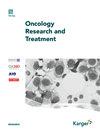消化道肿瘤的代谢重编程与免疫调节之间的关系
IF 2
4区 医学
Q3 ONCOLOGY
引用次数: 0
摘要
背景消化道癌症,包括结肠直肠癌(CRC)、胃癌(GC)和食管癌(ESCA),是最常见的癌症之一,也是全球癌症死亡的最重要的主要原因之一。这种有限的疗效可能源于肿瘤的异质性以及代谢重编程对肿瘤微环境(TME)中肿瘤细胞和免疫细胞的影响。葡萄糖、脂类、氨基酸和其他营养物质的代谢重编程是癌症的一个关键标志,可产生能量、减少等价物和生物大分子,从而促进肿瘤的增殖和侵袭。在这篇综述中,我们主要概述了消化道癌症(尤其是 CRC)在 TME 代谢重编程方面的最新进展,重点关注这些改变如何影响抗肿瘤免疫。此外,我们还探讨了解决这些代谢途径异常的潜在策略,以及抗癌免疫疗法领域中联合疗法的可行性。本文章由计算机程序翻译,如有差异,请以英文原文为准。
Association between metabolic reprogramming and immune regulation in digestive tract tumors.
BACKGROUND
The cancers of the digestive tract, including colorectal cancer (CRC), gastric cancer (GC) and Esophageal cancer (ESCA), are part of the most common cancers as well as one of the most important leading causes of cancer death worldwide.
SUMMARY
Despite the emergence of immune checkpoint inhibitors (e.g., anti-CTLA-4 and anti-PD-1/PD-L1) in the past decade, offering renewed optimism in cancer treatment, only a fraction of patients derive benefit from these therapies. This limited efficacy may stem from tumor heterogeneity and the impact of metabolic reprogramming on both tumor cells and immune cells within the tumor microenvironment (TME). The metabolic reprogramming of glucose, lipids, amino acids, and other nutrients represents a pivotal hallmark of cancer, serving to generate energy, reducing-equivalent and biological macromolecule, thereby fostering tumor proliferation and invasion. Significantly, the metabolic reprogramming of tumor cells can orchestrate changes within the TME, rendering patients unresponsive to immunotherapy.
KEY MESSAGES
In this review, we predominantly encapsulate recent strides on metabolic reprogramming among digestive tract cancer, especially CRC, in the TME with a focus on how these alterations influence antitumor immunity. Additionally, we deliberate on potential strategies to address these abnormities in metabolic pathways and the viability of combined therapy within the realm of anticancer immunotherapy.
求助全文
通过发布文献求助,成功后即可免费获取论文全文。
去求助
来源期刊

Oncology Research and Treatment
ONCOLOGY-
CiteScore
3.20
自引率
0.00%
发文量
84
期刊介绍:
With the first issue in 2014, the journal ''Onkologie'' has changed its title to ''Oncology Research and Treatment''. By this change, publisher and editor set the scene for the further development of this interdisciplinary journal. The English title makes it clear that the articles are published in English – a logical step for the journal, which is listed in all relevant international databases. For excellent manuscripts, a ''Fast Track'' was introduced: The review is carried out within 2 weeks; after acceptance the papers are published online within 14 days and immediately released as ''Editor’s Choice'' to provide the authors with maximum visibility of their results. Interesting case reports are published in the section ''Novel Insights from Clinical Practice'' which clearly highlights the scientific advances which the report presents.
 求助内容:
求助内容: 应助结果提醒方式:
应助结果提醒方式:


